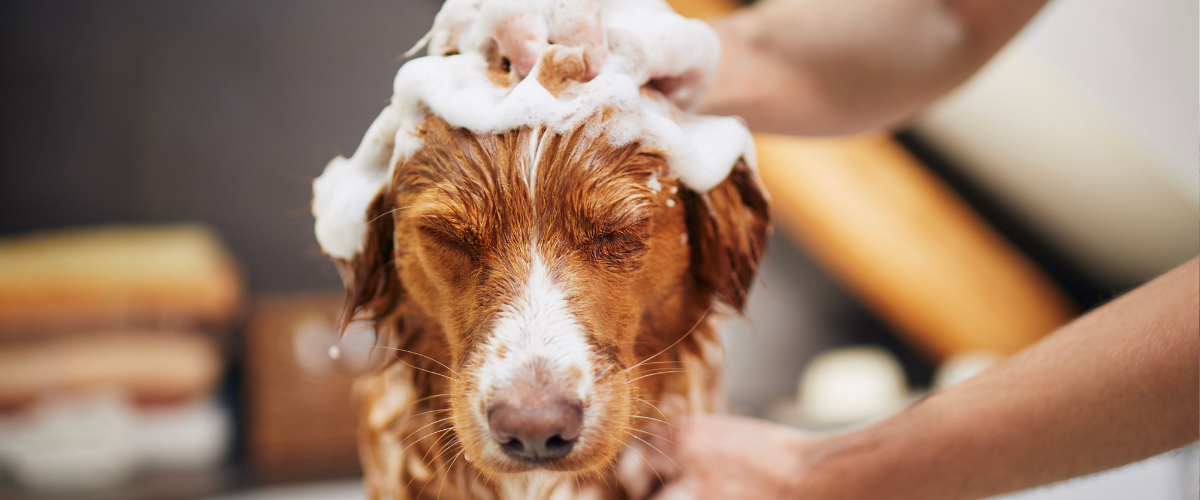Pets can suffer from allergies just like humans, and these allergies can lead to secondary infections if not managed properly. Here’s a detailed guide to the three main types of allergies and how to handle them effectively.
1. Flea Allergies

What Are Flea Allergies?
Flea allergies occur when your pet’s immune system reacts to flea saliva, causing intense itching, scratching, and skin infections.
Preventative Measures and Treatments
An oral flea adulticide that provides protection for up to 3 months. Your vet may suggest adjusting the Bravecto dosing schedule based on your pet’s specific needs.
- Sentinel
An insect growth regulator that prevents flea eggs from hatching. Use year-round.
- Capstar
If fleas are present despite prevention, administer Capstar several days a week to kill adult fleas quickly.

Household Treatment
- Flea Population
It may take up to 3 months to eradicate fleas from your home and yard. Regularly vacuum your home and wash pet bedding to help eliminate fleas and their eggs. Use Douxo Calm for baths to soothe itching and manage secondary skin infections.
2. Food Allergies
What Are Food Allergies?
Food allergies occur when a pet's immune system reacts to certain proteins or carbohydrates in their diet. Symptoms can include itching, digestive issues, and ear infections.
How to Diagnose and Treat Food Allergies
Food Trial
There is no definitive test for food allergies; a food trial is necessary. Start with a novel protein diet or a hydrolyzed protein diet such as Ultimino. Feed the trial food exclusively for 12 weeks. No treats or other foods are allowed. If you see improvement, you might transition to another hypoallergenic diet long-term. Avoid over-the-counter foods as they may contain allergens or be processed in ways that can lead to cross-contamination.

Resources
Consult resources like Balanceit.com, Petsdiets.com, and the American College of Veterinary Nutrition for guidance on specialized diets.
3. Environmental Allergies
Environmental allergies are typically diagnosed after ruling out fleas and food allergies. They may be triggered by pollen, dust mites, mold, or other environmental factors.
How to Diagnose and Manage Environmental Allergies
- Testing
After scheduling an appointment with your veterinarian, they will more than likely conduct specific blood and skin tests. If you are referred to a veterinary dermatologist, immunotherapy may be an option. Immunotherapy involves administering allergens to retrain the immune system. This can take 6 months to become effective and works for about 70% of patients.
- Environmental Control
Reduce exposure to known allergens by using air purifiers, keeping windows closed during pollen seasons, and cleaning frequently.

Managing Secondary Infections
Allergies often lead to secondary infections, particularly in the ears, skin, and anal glands.
Ear Infections
If your pet has an ear infection, your veterinarian will prescribe a certain medication based on their ear cytology findings. They will also instruct you to clean your pet's ears and apply the prescribed medication according to your pet's specific needs.
Skin Infections
Your veterinarian will perform a skin cytology to determine the best treatment for your pet's skin infection. In some cases, it may be necessary to conduct a skin culture. It will be recommended that you use shampoo and mousse for cleaning and treating the skin as well.

Managing Itchiness
An injection that provides relief for 4-6 weeks. It’s effective in over 90% of dogs but takes 1-3 days to start working.
Works within 4 hours and has an anti-inflammatory effect. It’s effective in over 80% of dogs but should not be used in dogs under 12 months or those with a history of cancer.
Bathing and Spot Treatment
-
Bathing
Bathe your pet weekly. Wet the coat thoroughly. Apply shampoo with a loofah and let it soak for 10 minutes before rinsing. Regular bathing helps remove allergens and soothe itchy skin.
-
Spot Treatments
Using products like Duoxo Chlorhexiderm Mousse, apply to scabby lesions. Soften the lesion, use a flea comb to remove debris, and reapply as needed.

Regular Follow-Ups
Recheck infections in 2-3 weeks to ensure that the treatment is effective and adjust as necessary.
By understanding these key points about pet allergies and following these management tips, you can help keep your furry friend comfortable and healthy. Regular veterinary visits and adherence to prescribed treatments are crucial for managing allergies effectively.
Conclusion
If you have questions and you'd like to reach out to us, you can call us directly at (760) 614-2362, or you can email us at [email protected]. Don't forget to follow us on social media Facebook, Instagram.
The Drake Center for Veterinary Care is an AAHA-accredited animal hospital located in Encinitas, CA. The Drake Center loves being a source of information for all pet owners across the country; however, if you have any questions regarding pet care and do not live in Encinitas, CA or surrounding cities, we encourage you to contact your local veterinarian.

